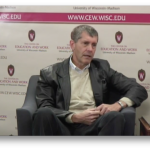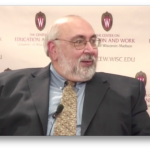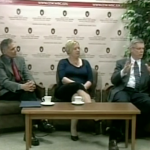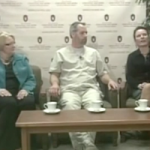Afternoon Tea Seminar Series
Afternoon Tea seminars were a series of conversations on career and workforce development in which V.Scott Solberg, Ph.D, who is currently a professor in counseling psychology at Boston University, conducted casual interviews with distinguished researchers and faculty in the field of vocational psychology. Afternoon Tea seminars were organized by the Center on Education and Work at University of Wisconsin-Madison.
Trian Tracy is a distinguished professor in counseling psychology at Arizona State University. He talked about a wide range of methods of career interest assessments.
Steven Brown, Ph.D. is a well-known faculty at Loyola University Chicago and a co-author of Social Cognitive Career Theory (SCCT). His talk focused on career decision-making difficulties as one of the major issues in career interventions and its solutions.
Mark Savickas, a professor at Northeastern Ohio Universities College of Medicine, is the author of Career Construction Theory and demonstrates a narrative method for helping clients in career counseling.
Ellen Henson is a senior employment service specialist in International labor Organization in Switzerland. She talked about global challenges especially career development needs of low- and middle-income countries.
John Vardallas is a founder and CEO of the American Bloomer sharing his perspectives about “All Things Bloomer.”
Dennis Winter is an expert and economic analyst modeling and forecasting and a vice-president and research of North Star Economics.
The conversation focused on learning what makes competitive and employable in today’s changing economy.
Graduate students who returned to college as an adult shared their experiences and resources they used to help them become successful and navigate challenges of going back to school.
The Nature and Use of Individualized Learning Plans as a Career Intervention Strategy
Individualized learning plans (ILPs) are being implemented in high schools throughout the United States as strategic planning tools that help students align course plans with career aspirations and often include the development of postsecondary plans. Initial indications are that ILPs may be an important method for helping students achieve both college and career readiness. Parents, teachers, and students indicate that ILPs result in students selecting more rigorous courses, better teacher–student relationships, and positive parent–school relations. This article describes the emergence and nature of ILPs, promising practice strategies as well as challenges associated with gaining whole school buy-in, and the potential for career and vocational research. For more information, click here.
Quality Learning Experiences, Self-Determination, and Academic Success- A Path Analytic Study Among Youth with Disabilities
Abstract: Although fostering self-determination has emerged as a central element of recommended and evidence-based transition practices for adolescents with disabilities, few studies have examined the paths through which students develop the skills and dispositions that can enhance their self-determination and successful transitions. The authors used path analyses to examine the ways in which exposure to quality secondary learning environments contributed to the development of self-efficacy, motivation, and academic achievement among 135 high school students receiving special education services. Students with disabilities who reported having greater involvement in learning environments reflecting recommended transition practices (i.e., high-quality learning environments) demonstrated increased career-search self-efficacy. Students with greater career-search self-efficacy were more highly engaged in goal setting, which further predicted their motivation to attend school and academic self-efficacy. Finally, students with higher academic self-efficacy were found to have higher grades. The authors offer recommendations for enhancing the self-determination skills and opportunities of youth with disabilities by strengthening the quality and impact of transition education. Learn more here.
Drs. Solberg and Ferrari’s Cross-Cultural Research Investigating Educator Views on Social Emotional Learning Achieves First Year Milestone
A cross-cultural team of predominately career development researchers led by Drs. Scott Solberg and Lea Ferrari (University of Padova co-Director) met in Padova, Italy July 9-10 to share the initial results of a five-year investigation into educator perceptions of the nature and value of social emotional learning. Click here to learn more.
Dr. Scott Solberg Leads a Cross-Cultural Study on Social and Emotional Learning
On July 9-10, 2019, a collaborative team of career development researchers from 20 countries will gather in Padova, Italy, to discuss each country’s results from the first phase of a cross-cultural study on Social and Emotional Learning (SEL). Click here to learn more.
Other Projects!
Other Career Development-Related Projects
Using career narratives to understand processes associated with forming a career identity among adolescent youth
Through a sample of 1,600 10th and 12th grade youth, this study involves a secondary qualitative analysis by using Howard and Walsh’s (2010) developmental model, Conceptions of Career Choice and Attainment (CCCA), and McAdams’s (1985) life-story model of identity. By using Marcia’s (1966, 1980) adolescent identity development, a stratified random sample of 90 narratives were also conceptualized as emerging from two processes – making a commitment to a career goal and active engagement in career exploration.
Family ability to support their youth with disabilities in preparing for post-school transitions: Strategies and challenges
Through the semi-structured interview of 30 family members and/or guidance of student with disabilities, the study uses a modified grounded-theory strategy to analyze and identify themes the interview narratives. The purpose of the study is to address the extent to which families were involved in career exploration and preparing for their children’s post-school transition, knowledge about the career development process, sources of support/connecting activities they have received, etc.
The National Collaborative on Workforce and Disability for Youth (NCWD/Youth)
The National Collaborative on Workforce and Disability for Youth (NCWD/Youth)
a. Individualized Learning Plan (ILP)
An individualized learning plan (ILP) is a document and an ongoing process in which students use to define their career goals and post-secondary plans. Many states have adopted policies that require all middle and/or high school students to develop and maintain their ILPs in order to make schools more personalized and improve student outcomes. Source: NCWD/Y
- Guideposts for Success
- Fact Sheet: Individualized Learning Plans
- Policy Brief: Using Individualized Learning Plans to Produce College and Career Ready High School Graduates
- Info Brief: Families and College and Career Readiness: What Schools Can Do to Engage Families in the Individualized Learning Pan (ILP) Process
- Info Brief: Understanding the New Vision for Career Development: The Role of family
- Use of Individualized Learning Plans: A Promising Practice for Driving College and Career Efforts
- Promoting Quality Individualized Learning Plans - A “How to Guide” Focused on the High School Years
- The Nature and Use of Individualized Learning Plans as a Career Intervention Strategy
- Developing Self-Determination and Career Readiness Skills Through Individualized Learning Plans
b. State Leader Network
Policy analysis of career development: Alignment of the evidence base to state mandates
The study involves a policy analysis of the executive orders and regulation guidelines being used in all 36 states in the United States. The purpose of the analysis is to determine the extent to which current policy language reflects career development evidence based on supporting career readiness among youth with and without disabilities. The policy analysis will also evaluate the extent to which policy implementation guidelines include insuring that youth can get access to career exploration activities, career planning and management activities etc.
Youth access to employability or employment programs and activities: Policy analysis of United States career and workforce development efforts
The study involves a web-based policy analysis of career and workforce development programs and activities in all fifty states in the United States to determine the extent to which youth with and without disabilities can get access to career development activities as opposed to employment services. The study utilizes coding strategies on what current programs and activities focus and how they are implemented.
c. Career and Education Planning in non K-12 Settings
Case Study on Career Planning for Postsecondary and Workforce Development
The study involves identifying examples of organizations and postsecondary institutions that are successfully using individualized plans to promote postsecondary and workforce development.
Right Turn Program Evaluation Study
The Right Turn Career-Focused Transition Initiative is a career development program for youth that are involved or at risk of becoming involved in the juvenile justice system. Right Turn is being implemented in five high crime communities across the country. This comprehensive program engages youth in education, training and workforce development through a 3-phase career development process: a) Self-Exploration, b) Career Exploration, and c) Career Planning and Management. Additionally, youth participate in restorative justice projects to give back to their communities. Mentors, case managers and other caring adults support the youth during and after the completion of the program. The purpose of this evaluation study is to examine the experiences of key stakeholders in the Right Turn program. The key stakeholders include the case managers, youth, and the employers/partners that employ the youth. The aim of the study is to gain a deep understanding of the nature of the Right Turn program.
Career Development Implementation Strategies Guide
Ensuring that all youth are career and college ready upon high school graduation has become a primary education goal in most states. A promising method of attaining this goal is to engage all youth in quality comprehensive career development programs and activities. The purpose of the Career Development Implementation Strategies Guide is to support states in their efforts to improve career development opportunities for all youth, including youth with disabilities, by providing state-level functional and pragmatic guidance on implementing quality comprehensive systems of career development. The central theses of the Guide are (1) that in order to become career ready, all youth need to be provided with access to quality career development programs and (2) that career readiness drives college readiness. The guide is divided into two parts. Part I serves as a primer to quality youth career development systems and Part II serves as an implementation guide. Specifically, Part II identifies seven promising career development implementation strategies and accompanying resources for each strategy.
The Massachusetts Institute for College and Career Readiness
Massachusetts Institute for College and Career Readiness (MICCR)
The Massachusetts Institute for College and Career Readiness (MICCR) has been developed to promote working alliances between researchers and policymakers in the use and interpretation of data and evidence to guide decision-making and improve student outcomes. The MICCR has developed through the collaboration of Boston University School of Education, MassInc’s Gateway Cities Innovation Institute (GCII), and the Rennie Center for Education Research & Policy.
Over the three year grant period, the MICCR will recruit a national cohort of established education researchers to work with teams of local decision-makers in Massachusetts’ Gateway Cities, defined as historically thriving manufacturing communities with 50,000 to 250,000 residents. Key programmatic features include three annual two-day workshops to develop and advance locally determined college and career readiness projects and facilitate networking across communities; a webinar symposia to support project implementation through continued explorations of best practice; and bimonthly project meetings to discuss and examine progress. Source: MICCR







